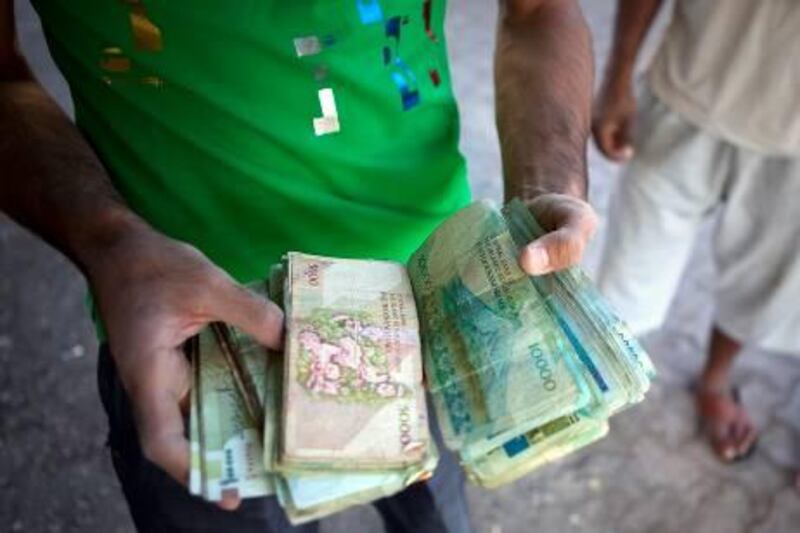KHASAB, OMAN // As tensions rise between Iran and the West over the Strait of Hormuz, smugglers who have plied their trade across its shining waters are all but oblivious to the international discourse.
Their families have worked through war and the young men are prepared to do so again, they say.
Each day, the smugglers journey to Bandar Abbas and Qeshm Island, about 40 kilometres from Khasab. They do not move contraband across the strait, only household goods. And they have only one fear: the exchange rate between the Iranian and the Omani rials.
Abdulrahman Aivi, 32, is tired of life as a smuggler. Born in Bandar Abbas, he is ready to leave his job of two years and rejoin an old girlfriend in Thailand where he will make shoes.
Economics, and not politics, may be what stops Mr Aivi from smuggling. He plans to quit soon if the value of the Iranian rial does not rise.
An estimated 60 per cent of the traders, who mostly hail from Iran and Afghanistan, have left the business in the past five years as inflation in Iran has risen to 22.5 per cent. But in Iran, where unemployment last year was 15 per cent and rising, a poor job is better than no job at all.
Trade between Iran and coastal Arab ports including Khasab, Ras Al Khaimah and Dubai is centuries older than the cities themselves.
As far as the traders are concerned, international politics are of little consequence; it is the threat of jail or injury at the hands of pirates and police that constitute the danger.
Currently, 1 Omani rial (Dh9.5) is worth 29,262 Iranian rials. Mr Aivi is not the only trader who will quit if inflation gets any worse.
Hassan Sulaiman, 42, quit the business three years ago when tourism presented better opportunities than smuggling.
"I'm a captain since age 9 and I'm looking for the best work," he said. "Before, it was smuggling."
Mr Sulaiman is unusual in that he is Omani. He learnt to speak Jaziri, an island dialect spoken by most smugglers, from friends as a child. He joined the smugglers at age 14 when the business was still profitable. At that time, he made three trips a day to the islands around Qeshm.
"We're neighbours," he said. "I didn't think about that job before but I knew to speak the language. I met many Iranians and the idea came from them. Now, this business has no money."
Still, business is robust in Khasab, a peaceful port town in the Omani exclave of Musandam.
Traders leave for Iran with household items -clothes, shoes, cigarettes, soft drinks, CDs, watches, perfume, make-up and even small trees - and return with goats, cows and occasionally drugs. But generally the trade is one-sided, to Iran via Oman.
Exporting goods from Oman is legal, but many of the items are banned under Iran's laws, which prohibit foreign goods that can be made locally.
The brisk trade in the harbour is supervised and regulated by Omani officials, who collect a tax on the goods sent across the strait. The smugglers are trying to avoid Iran's bureaucracy and high tariffs.
For the most part, the smugglers are simply delivery men. They earn low wages, do not choose their cargo and are not involved in high-volume business.
Oman is Iran's closest political ally in the Gulf and has been since the time of the Shah, when the Iranian military helped the Sultan of Oman end the Dhofar revolt from 1962 to 1976.
After the Iranian revolution, black-market trade was common across the coast and in the UAE, but most of it shifted to Khasab about 25 years ago as after the UAE tightened its borders.
Rashid Ali, a fisherman who is about 55, was dismissive of politics.
"They're talking things to each other but no one's scared," he said. "For the trader this talk is not good but right now it's no problem. Just the Iranian police is a problem for these men."
Mr Ali recalled that even 30 years ago he would fish off the coast of Bandar Abbas. No invisible line could divide the sea and the men to whom it belonged.
Now, dozens of lorries loaded with goods cross at Al Dara every day loaded with goods bound for Iran. Once in Khasab, the goods are loaded onto speedboats that make their way across the strait. Some travel three times a day.
Such deliveries are a vital part of Iran's economy, which takes in an estimated Dh20.2 billion worth of smuggled goods annually.
Fishermen and traders have heard bellicose talk in the region before and expect to hear it again.
"People are poor and the trade will never end," Mr Ali said.






